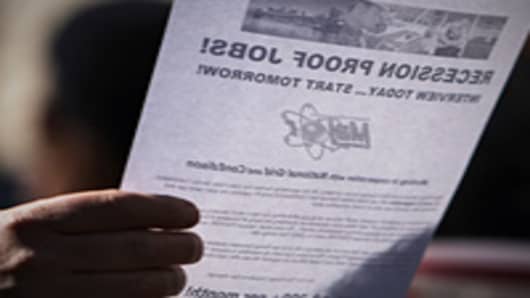Permanent increases in federal spending and regulatory burdens are further encouraging outsourcing and discouraging hiring.
Prior to the 2008 crisis, President Bush spent 19.6 percent of GDP and the deficit was $161 billion; whereas President Obama's budget projects outlays at 25.1 percent of GDP and a $1.3 trillion deficit in 2011, assuming the economy is growing at 4 percent. Most economists just don't see growth that robust, and the government's share and federal deficits are likely to be much greater than President Obama's economic team is projecting.
Too much spending will require too many new taxes-and not just pushing rates marginally above 50 percent on families earning $250,000. Fears about new taxes and more regulations are stifling business investment and further encouraging outsourcing.
Without addressing oil and China, and curbs on government spending and smarter regulatory reforms, other efforts to create jobs are futile.
The moratorium on deep water drilling, though popular with environmentalists, kills jobs in petroleum and supporting industries and sends too many consumer dollars abroad that could be spent here, creating U.S. jobs.
Detroit has the technology to build much more efficient and attractive gasoline-powered vehicles now, and a national policy to rapidly replace the existing fleet would reduce oil imports and create many high-paying jobs.
China's purposefully undervalues the yuan making its products artificially cheap and deceivingly competitive on U.S. and European store shelves, and Beijing's promises of new flexibility on exchange rates have not translated into meaningful actions.
Beijing prints billions of yuan to purchase dollars and other currencies in foreign exchange markets to push down the value of the yuan, creating a 35 percent subsidy on exports. Beijing's purchases exceed $450 billion annually.
Without progress on currency manipulation by China, Japan and others, which essentially fix exchange rates, efforts to jump start growth through "quantitative easing" and other central bank tricks won't work. Those won't change the consequences of aggregate trade deficit of western economies via Asian currency manipulators-in fact, it could make those deficits worse.
As Ben Bernanke wrote with co-author Andrew Abel in their macroeconomics textbook, a central bank operating under fixed exchange rates "...cannot use monetary policy to pursue macroeconomic stabilization goals."
Unless Barack Obama stands up to China on exchange rates, Ben Bernanke knows his options are severely constrained.
A U.S. tax on conversion of dollars into yuan could be set to just offset the subsidies Beijing provides Chinese producers exporting into the United States, and cause prices of Chinese products to reflect their true cost to the U.S. economy. That would stimulate U.S. manufacturing and supplying industries more than any spending package Congress could conspire.
Simply, the tax could be set equal to China's official purchases of foreign currency divided by its exports-currently about 35 percent-and be phased out as China reduces its currency intervention and lets the value of the yuan rise.
If President Obama wants to fix the federal deficit and create jobs, perhaps he should spend less, get serious about better using and developing American energy resources and implement a currency tax.
Then the Asian Wall Street Journal could treat its readers to stories about the American industrial renaissance.
Peter Morici is a professor at the Smith School of Business, University of Maryland, and former Chief Economist at the U.S. International Trade Commission.


